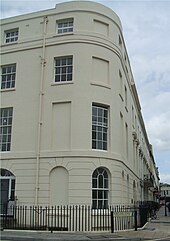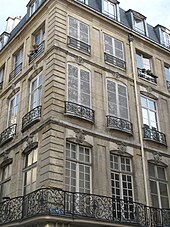Window tax
The window tax was a tax , which one owner to his living room belonging window had to pay.
They existed in France from November 24, 1798 (4th Frimaire VII) over 100 years as door and window control (annual yield about 60 million francs ), in England , introduced from 1696 to 1851 to replace the oven control to their Collection of the tax officials had to enter the respective house, in Spain until 1910, in the Netherlands from 1821 to 1896 as part of the personal tax .
France
In France there was a door and window tax until 1926, which was only applied to rentable houses. The tax was levied in the event of renting or willfully vacant. Agricultural spaces, cellars, roofs and spaces used in the public service were not counted. The tax was paid by the main tenant or owner, who could collect it from the tenants according to their share.
It is said that as a result of this tax, houses built in France in the 19th century usually only had one to three windows.
In the realm of Alsace-Lorraine , annexed by the German Reich in 1871 , the door and window tax was abolished in 1895.
Germany
In Germany there was the door and window tax from 1798 in the areas on the left bank of the Rhine occupied by France in 1797 and from 1811 also in the Kingdom of Westphalia established in 1807 . In its capital, Kassel , the Fünffensterstraße near the town hall still reminds of this time.
Even after the end of Napoleon's foreign rule in these territories, the German rulers who came to power there initially retained this tax. B. in the Prussian provinces of Lower Rhine , Westphalia and Jülich-Kleve-Berg , in Kurhessen , and in Hesse-Darmstadt Rheinhessen .
England

In England , the window tax was first imposed in 1695 to compensate for lost revenue from filing coins . Initially two shillings were charged for each house , later four shillings were paid for buildings with 10 to 20 windows and eight shillings for more than 20 windows. As these fees got out of hand, the so-called “clogging”, ie bricking up windows, came into fashion. Blind windows and bricked-up windows were exempt from the tax, provided that the filling material harmonized with the adjacent walls. In order to save taxes, more and more homeowners bricked up the windows of their houses, whereby a growing number of citizens were deprived of daylight. In the poorer parts of the city in particular, this took on grotesque proportions over time. The tenements built in the early days of industrialization were almost windowless because of this tax. The increasingly unpopular tax was abolished in 1851.
Netherlands
The window tax was part of the "personal tax", which taxed the rental value, doors, windows, chimneys, furniture, servants and horses. The amount of the tax was not based on the size of the openings in the doors and windows, but on the size of the community: 40 cents in smaller towns or 1.10 guilders in larger ones .
Portugal
In Portugal , a new law was passed in 2016 whereby windows with a pleasant view lead to a higher property tax.
Individual evidence
- ^ Johann Friedrich Benzenberg : About Prussia's budget and the new tax system. FA Brockhaus, Leipzig, 1820, pp. 74-75
- ↑ http://www.weiterbildung-buchhaltung.de/buchfuehrung/kuriose-steuern.php
- ↑ http://www.theportugalnews.com/news/daylight-robbery/39066
